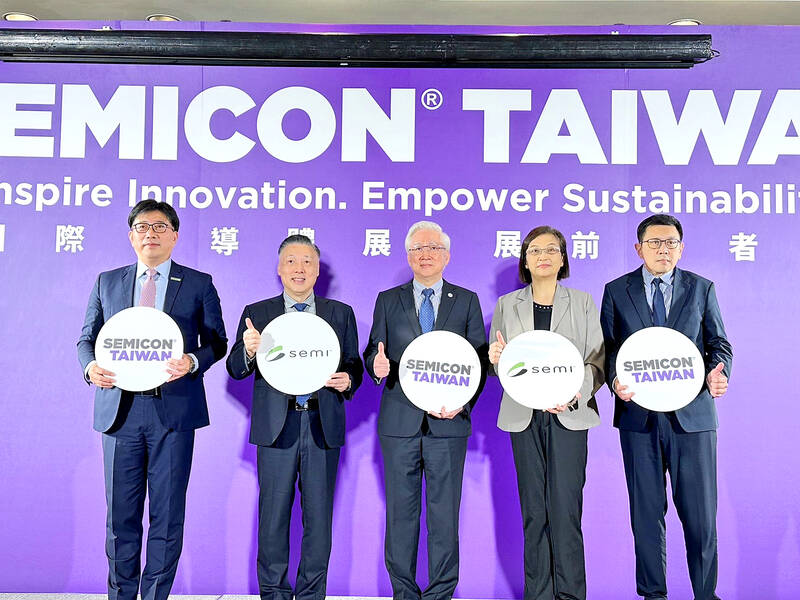ASE Technology Holding Co (日月光投控), the world’s largest chip packaging and testing service provider, yesterday said it is expanding capacity at a factory in Penang, Malaysia, as the company is bullish about longer-term semiconductor demand driven by artificial intelligence (AI) and people-to-machine and machine-to-people applications.
The company expects the first building of the Malaysian factory to start operations in July next year, with construction of a second building to begin in 2025, ASE chief operating officer Tien Wu (吳田玉) told reporters on the sideline of a news conference for the Semicon Taiwan trade show in Taipei.
The Penang factory is expected to generate US$750 million in revenue in two to three years, doubling from its current US$350 million, the company said.

Photo: Grace Hung, Taipei Times
Wu said that ASE is also expanding capacity in California through its US subsidiary, ISE Labs Inc, in response to customer requests.
ISE Labs plans to acquire a building in San Jose for US$24 million, ASE said last week.
In Taiwan, ASE is boosting capacity at factories in Kaohsiung, Taoyuan and Taichung, Wu said.
Although the industry is undergoing an inventory correction, the demand outlook remains strong in the long term, with global semiconductor revenue likely to reach US$1 trillion in 2030, fueled by demand for chips to power AI, robots, electric vehicles, advanced driver-assistance systems and Internet of Things devices, he said.
GlobalWafers Co (環球晶圓), the world’s No. 3 silicon wafer supplier, yesterday said that the second half of this year would be tough as most customers are still digesting inventories.
However, most customers are reporting a rebound in revenue this quarter, GlobalWafers chairwoman Doris Hsu (徐秀蘭) said, adding that customers are steadily leveling off inventories.
“We have high hopes for a recovery in the first half of next year. From the second quarter next year, we expect to see a more significant pickup,” Hsu said.
However, semiconductor companies are facing pressure to diversify production locations to address geopolitical tensions and a push to reduce carbon emissions, she said.
To boost supply chain resilience, GlobalWafers and some Taiwanese companies have been asked to build capacity beyond Taiwan, which fragments capacity and raises manufacturing costs, Hsu said.
GlobalWafers faces milder pressure compared with its peers as it has diversified to 10 countries through mergers and acquisitions over the past 20 years, Hsu said.
The company also plans to spend NT$100 billion to expand capacity at its fabs for three years beginning this year, and is building a new fab in Texas, she added.

Shiina Ito has had fewer Chinese customers at her Tokyo jewelry shop since Beijing issued a travel warning in the wake of a diplomatic spat, but she said she was not concerned. A souring of Tokyo-Beijing relations this month, following remarks by Japanese Prime Minister Sanae Takaichi about Taiwan, has fueled concerns about the impact on the ritzy boutiques, noodle joints and hotels where holidaymakers spend their cash. However, businesses in Tokyo largely shrugged off any anxiety. “Since there are fewer Chinese customers, it’s become a bit easier for Japanese shoppers to visit, so our sales haven’t really dropped,” Ito

The number of Taiwanese working in the US rose to a record high of 137,000 last year, driven largely by Taiwan Semiconductor Manufacturing Co’s (TSMC, 台積電) rapid overseas expansion, according to government data released yesterday. A total of 666,000 Taiwanese nationals were employed abroad last year, an increase of 45,000 from 2023 and the highest level since the COVID-19 pandemic, data from the Directorate-General of Budget, Accounting and Statistics (DGBAS) showed. Overseas employment had steadily increased between 2009 and 2019, peaking at 739,000, before plunging to 319,000 in 2021 amid US-China trade tensions, global supply chain shifts, reshoring by Taiwanese companies and

Taiwan Semiconductor Manufacturing Co (TSMC) Chairman C.C. Wei (魏哲家) and the company’s former chairman, Mark Liu (劉德音), both received the Robert N. Noyce Award -- the semiconductor industry’s highest honor -- in San Jose, California, on Thursday (local time). Speaking at the award event, Liu, who retired last year, expressed gratitude to his wife, his dissertation advisor at the University of California, Berkeley, his supervisors at AT&T Bell Laboratories -- where he worked on optical fiber communication systems before joining TSMC, TSMC partners, and industry colleagues. Liu said that working alongside TSMC

TECHNOLOGY DAY: The Taiwanese firm is also setting up a joint venture with Alphabet Inc on robots and plans to establish a firm in Japan to produce Model A EVs Manufacturing giant Hon Hai Precision Industry Co (鴻海精密) yesterday announced a collaboration with ChatGPT developer OpenAI to build next-generation artificial intelligence (AI) infrastructure and strengthen its local supply chain in the US to accelerate the deployment of advanced AI systems. Building such an infrastructure in the US is crucial for strengthening local supply chains and supporting the US in maintaining its leading position in the AI domain, Hon Hai said in a statement. Through the collaboration, OpenAI would share its insights into emerging hardware needs in the AI industry with Hon Hai to support the company’s design and development work, as well